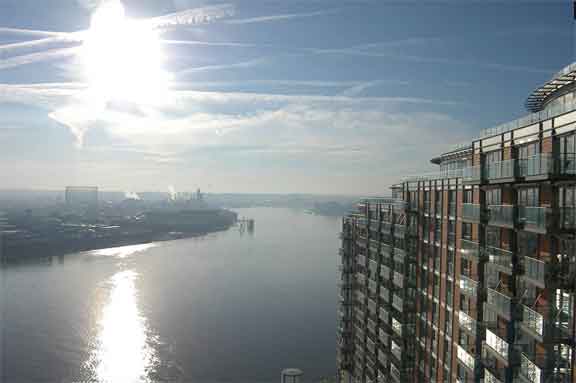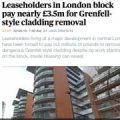
Dublin-based developer Ballymore has bluntly told an MP that leaseholders will have to pay to remove Grenfell ACM cladding panels at New Providence Wharf in Poplar, east London.
It joins Aussie developer Lendlease, which is refusing to pay out – or explain why not – at Cypress Place and Vallea Court in Manchester.
A figure of £2.4 million is aired, although it is unclear at this stage whether this is for the fire marshals, or to remove the cladding.
Sean Mulryan and his family own 100% of Ballymore, which was founded by the former bricklayer in 1982, and supposedly owns more land in London than the Duke of Westminster.
Ballymore’s UK arm posted pre-tax profits of Euro 587 million in 2016 – £122.8 million gross profit..
Ballymore’s UK property arm posted profit of €587m in 2016
Sean Mulryan’s Ballymore Properties recorded a pre-tax profit of £518 million (€587 million) at its UK arm following a revaluation of some of the group’s investment properties, a gain arising on the settlement of financial obligations, and forfeited deposits.
Nonetheless, the Mulryans have decided not to heed ministers’ pleas that developers “do the decent thing” and pay to remove the Grenfell cladding rather than dump the bill on their former customers.
Ballymore owns the freehold to New Providence Wharf, built in 2005, through Landor Residential Limited and the management company, Ballymore Asset Management.

The group told Jim Fitzpatrick, Labour MP for Poplar and Limehouse and LKP patron:
“I can confirm that it is the freeholder’s intention to charge the leaseholders the cost of the replacement of the ACM panels.
“The lease in this case indemnifies the freeholder against costs, given that the financial interest of the building is essentially owned collectively by the leaseholders and little economic value is retained by the freeholder.
“Given the age of the building, the warranty periods have expired so there is no legal recourse to pursue against builder and/or subcontractors, even if we deemed this appropriate.”
This reply (in full, below) is curious on two points.
1/ It acknowledges that the freeholder’s financial interest in the building is minimal. This begs the question: so, why does it profit from the management, rather than allow the leaseholders to run the site?
2/ The freeholder, with minimal financial involvement, makes the decision whether to pursue a claim against the builder – ie Ballymore itself – or sub-contractors “even if we deemed this appropriate. Er … In what circumstances would Ballymore decide to proceed against itself, one wonders?
The directors of Ballymore Asset Management are David Pearson and John Mulryan, son of the founder, who are also the directors for Landor Residential Limited, with the addition of Sean Mulryan himself.
Sean Mulryan: the man who owns land in every corner of London
© Tom CampbellLondon property tycoon Sean MulryanFew property barons come bigger than multi-millionaire Sean Mulryan. He owns more land in London than the Duke of Westminster, not bad for the 56-year-old, one of seven children born into a farming family and rural poverty in western Ireland.
New Providence Wharf is a landmark development by Ballymore, completed in 2005;. New Providence Wharf residents benefit from use of the brand new gym, 25 metre swimming pool, sauna & steam room in Charrington Tower, as well as 24 hour concierge & site security.
Ballymore claims: “We completed c.2000 homes in London in 2016, and 7,000 more are currently under-construction with forward sales of c.£2.6bn. Our land bank gives us the capacity to add a further 9,000 homes to meet future demand.”
Ballymore letter to Jim Fitzpatrick:
The New Providence Wharf residents’ association can be contacted here:
NPWLRA
“Making our Home and Area a Better Place” The NPWLRA welcomes you to the residential community of New Providence Wharf which comprises the residential blocks of New Providence Wharf, Michigan Building, Ontario Tower, Charrington Tower and Columbia West. There are a total of 1259 individual apartments on the NPW Estate.






 Law Commission: no problem employing barrister Justin Bates to reform right to manage, while he sets about stuffing another one …
Law Commission: no problem employing barrister Justin Bates to reform right to manage, while he sets about stuffing another one …





















Not a matter of doing the decent thing, the developer should be required to pay.
surely those that certified the material as suitable for cladding should be held accountable – almost certainly they will have indemnity insurance and it will ultimately be their insurers who will have to pay
This is another classic example that we need legislation, rather than airy fairy fluffiness about the freeholder ‘doing the right thing’ The construction company the managing agents, the freeholders, essentially being the same entity, and getting all the associated tax breaks, as well.
How about the government doing ‘the right thing”?
This just adds to the leasehold scandal. Everything leasehold should be abolished for these reasons. The people who buy these properties should have control over it and then if any issues it is up to them to sort it out. Freeholders just take money from leaseholders and do nothing else. They authorised the cladding to be put on so any issues is between them and whoever put the stuff up…. Stick an end date on when leasehold will be abolished and between that date and now resolve all the current Leaseholders so they can get their freeholds back. Freeholders/investors are just taking advantage of everyone and everything.
This may work?
Every developer/freeholder that fails to replace cladding at their own expense shall be barred from developing any other sites.
Additionally Enforcement notices should be placed on freeholders requiring them to replace the cladding. Large fines must be imposed for freeholders who fail to comply with enforcement measures.
Who should pay can then be settled at a tribunal? The priority must be to make people safe. Should it prove under the law that leaseholders are responsible they should either be allowed to pay over a 25 year period (without interest) or the costs of the replacement cladding should be deducted from any enfranchisement cost? After all, a building with potentially lethal cladding is unsaleable so its value has been compromised.
Some excellent points raised….which, I 100% agree with.
Me fears that legal costs will go through the roof. If leaseholders lose and appeal there is no limit on the costs.
It is a terrifying prospect for leaseholders fighting billionaires in a legal system where money can buy the right result.
The one useful thing politicians should do is end leasehold and set up an Ombudsman favouring homeowners.
Absolutely disgusting.
When is government actually going to intervene?
Why isn’t The Guardian et al concerned about this in the way they were with cladding costs in the social rented sector?
The problem with freeholders is that they want their cake and eat it…one minute they claim that their interest is minimal when they should pay out for the replacement of cladding, however their interest is massive when dealing with lease extensions.
The government is TOO SOFT ON FRERHOLDERS….and instead of asking freeholders would they like to pay for cladding, they should make FREEHOLDERS, NHBC & Councils (who, authorised the use of such building materials) jointly responsibility for the total costs as they used, signed off such building materials OR provided a warranty for such materials!!
The leaseholders is the innocent party in this situation, YET they are lumbered with the costs of security with fire marshalled, the cost of the removal of the cladding, AND THEIR LIVES ARE IN DANGER!!
However, the builder, the NHBC and the council (additional council tax, funding for schools, Doctors, hospitals, fire services contributions, Major of London contribution are all required as part of planning consent being authorised) have all benefited via the sale of the same property….so, they should all provide a refund towards the leaseholders costs!
Freeholders INTERESTS are protected by the courts when a freeholder is missing and they breach the leaseholders contract…yet, the leaseholder is compelled to cover extra Solicitors, Investigator and Court cost etc! Yet, if a leaseholders breaches their contract by doing something without consent (changing a front door, changing a kitchen or bathroom etc) , the leaseholders faces forfeiture plus Freeholders costs and Court costs.
The tribunals have been proved to be massively biased in freeholders favours (freeholder breached the tribunal directions yet no penalty, the judge stated in the decision that both Surveyors agreed that the ground rent doubles- yet the freeholders desktop surveyor was not present & despite being present and the head surveyor on the panel and I claiming otherwise, he ignored us), probably as a result that judges are freeholders themselves or they are supporting their friends (one favour for another) not forgetting the Mundy case (how on earth, can failures in the current leasehold extension process be identified & a much better method of calculation be found, but the courts indirectly state it is not 100% perfect, so we shall continue to use a method of calculation that substantially favours freeholders!!).
This government NEEDS to step up and sort out the massive injustice faced by leaseholders, otherwise the Government should be facing legal proceedings for the recovery of leaseholders costs/recovery of marriage value AND BREACHING OUR HUMAN RIGHTS!! Marriage VALUE is simply a reward permitted by the Government to freeholders at the expense of leaseholders! Marriage VALUE is not detailed in ANY LEASEHOLDERS CONTRACT and should not be applied in CALCULATING a lease extension….and why the Government is permitted to intervene in levelling a non binding cost that is NOT even a Government tax is ridiculous.
FREEHOLDERS DO NOT NEED TO BE COMPENSATED FOR THE LOSS OF MARRIAGEVALUE, AS THEY WERE NEVER ENTITLED TO MARRIAGE VALUE, IN THE FIRST INSTANCE.
However, the fact that marriage value is NOT A defined monetary sum or transparent cost at the outset of a property purchase, would NOT BE PERMITTED in any other sector, so why are lease extension in a law of their own!
Justice FOR LEASEHOLDERS!!!
Marriage value is justified on the basis that the freeholder is being forced to give up an asset which was not provided when the lease was granted . Enfranchisement /lease extension creates a profit and it would seem equitable that it is apportioned 50:50
It may not be appropriate where the lease was granted post 1993 when both parties knew of the existence of the 1993 Act
Where a lessee has to spend time and money tracking down an absent freeholder this should be recoverable /deducted from the premium payable on
Stephen, after a lease extension has been granted the freeholder still retains the freehold (and has received the ground rent in advance)….so, I’m slightly confused how it can be claimed that they have lost their asset as your only allowed to my knowledge to extend your lease once??
They will have lost the right to the income and receipt of the reversion is delayed by 90 years.